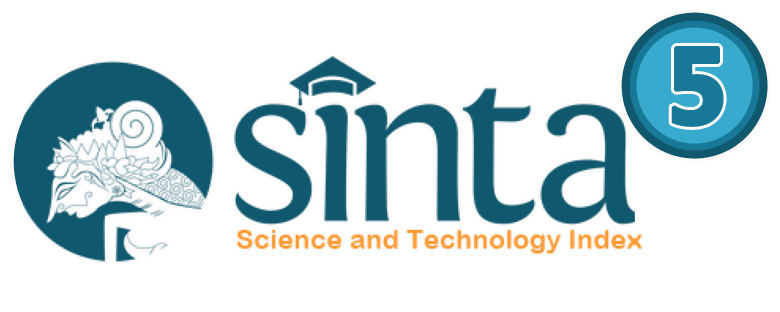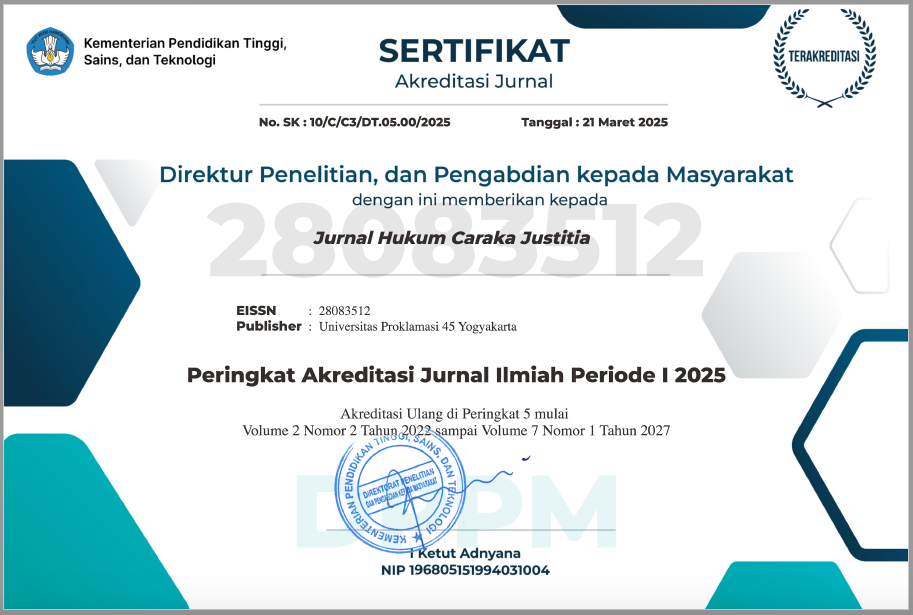Kewenangan Penyelesaian Sengketa Pemilihan Kepala Daerah Pasca Putusan Mahkamah Konstitusi Nomor 85/PUU-XX/2022
DOI:
https://doi.org/10.30588/jhcj.v2i2.1380Keywords:
Supreme Court, Constitutional Court, Pilkada.Abstract
Indonesia is a country that upholds people's sovereignty which is carried out based on law, this is confirmed constitutionally in Article 1 paragraph (2) of the 1945 Constitution. In electing leaders, the people are allowed to determine them directly, namely through an election process. At the regional level, there are Regional Head Elections (Pilkada). Initially, the Supreme Court had the authority to resolve regional election disputes as emphasized in Article 106 paragraph (1) of Law Number 32 of 2004 concerning Regional Government. In its development, this authority was transferred to the Constitutional Court with the passing of Law Number 12 of 2008 concerning the Second Amendment to Law Number 32 of 2004 concerning Regional Government. Then, the authority of the Constitutional Court in deciding disputes over regional head election results was declared unconstitutional through Constitutional Court Decision Number 97/PUU-XI/2013. However, in the end, the Constitutional Court again took over the authority to resolve regional election disputes through Constitutional Court Decision Number 85/PUU-XX/2022. In this study, we will discuss the authority to resolve regional election disputes while still at the Supreme Court. Then, the following discussion examines the discourse on forming a particular judicial body in resolving regional election disputes. The final debate will examine the authority to resolve regional election disputes of the Constitutional Court from when it was still a temporary authority until it became a permanent authority after Constitutional Court Decision Number 85/PUU-XX/2022.
References
Artikel Jurnal
Daud, Rosy Febriani, & Slamet Haryadi. “Membangun Citra Positif Masyarakat terhadap Penyelesaian Sengketa Pilkada dalam Upaya Memperkuat Legitimasi”. Journal of Election and Leadership (JOELS) 3, no. 2 (September 2022): 101-110. https://journal.unilak.ac.id/index.php/joels/article/download/9013/4296.
Harefa, Yonata, Haposan Siallagan, & Hisar Siregar. “Urgensi Pembentukan Badan Peradilan Khusus Dalam Penyelesaian Sengketa Hasil Pilkada Langsung”. Nommensen Journal of Legal Opinion (NJLO) 1, no. 1 (Juli 2020): 139-152. https://ejournal.uhn.ac.id /index.php/opinion/article/download/342/446.
Jailani. “Sistem Demokrasi Di Indonesia Ditinjau Dari Sudut Hukum Ketatanegaraan.” Jurnal Inovatif VIII, no. 1 (Januari 2015): 134-147. https://mail.online-journal.unja.ac.id/jimih/article/view/2197/7687.
Labolo, Muhadam. “Menimbang Kembali Alternatif Mekanisme Pemilihan Kepala Daerah Di Indonesia”. Jurnal Administrasi Pemerintahan Daerah VIII, no. 2 (2016): 1-16.
Naibaho, Rinsofat, & Indra Jaya M. Hasibuan. “Peranan Mahkamah Agung Dalam Penegakan Hukum Dan Keadilan Melalui Kekuasaan Kehakiman”. Nommensen Journal of Legal Opinion (NJLO) 2, no. 2 (Juni 2021).
Nazriyah, R. “Penyelesaian Sengketa Pilkada Setelah Putusan Mahkamah Konstitusi Nomor 97/PUU-XI/2013”. Jurnal Konstitusi 12, no. 3 (September 2015): 447-472.
Noviati, Cora Elly. “Demokrasi dan Sistem Pemerintahan.” Jurnal Konstitusi 10, no. 2 (Juni 2020): 333-354.
RS., Iza Rumesten. “Dilema dan Akibat Hukum Putusan Mahkamah Konstitusi Mengenai Kewenangan Memutus Sengketa Pilkada.” Jurnal Konstitusi 11, no. 4 (Desember 2016): 693-713.
Salim, Hardy. “Kewenangan Mahkamah Konstitusi Dalam Mengadili Perkara Perselisihan Hasil Pemilihan Kepala Daerah (Suatu Kajian Terhadap Putusan Mahkamah Konstitusi Nomor 97/PUU-XI/2013 Jo. Putusan Mahkamah Konstitusi Nomor 072-073/PUU-II/2004)”. Jurnal Hukum Adigama 1, no. 2 ( 2018): 1-125.
Suhartono, Slamet. “Konstitusionalitas Badan Peradilan Khusus dan MK dalam Penyelesaian Sengketa Hasil Pilkada Langsung”. Jurnal Konstitusi 12, no. 3 (September 2015): 503-523.
Buku
Efendi, Jonaedi, & Johnny Ibrahim. Metode Penelitian Hukum Normatif dan Empiris. Depok: Kencana, 2018.
Hoesein, Zainal Arifi, & Rahman Yasin. Pemilihan Kepala Daerah Langsung. Jakarta: LP2AB, 2015.
Ishaq. Metode Penelitian Hukum dan Penulisan Skripsi, Tesis serta Disertasi. Bandung: Alfabeta, 2017.
Jurdi, Fajlurrahman. Hukum Tata Negara Indonesia. Jakarta: Kencana, 2019.
Satriawan, Iwan et,al. Studi Efektifitas Penyelesaian Sengketa Hasil Pemilukada oleh Mahkamah Konstitusi. Jakarta: Kepaniteraan Dan Sekretariat Jenderal Mahkamah Konstitusi Republik Indonesia, 2012.
Soekanto, Soerjono. Pengantar Penelitian Hukum. Jakarta: UI-Press, 2010.
Internet
Kompas.com. “Wacana Pembentukan Peradilan Pemilu, Bawaslu Sebut Perlu Kajian Mendalam”. https://nasional.kompas.com/read/2020/08/03/13341311/wacana-pembentukan-peradilan-pemilu-bawaslu-sebut-perlu-kajian-mendalam (diakses 17 Desember 2022).
Mkri.id., “Kewenangan MK Menyelesaikan Sengketa Pilkada Bersifat Permanen”. https://www.mkri.id/index.php?page=web.Berita&id=18566&menu=2> (diakses 18 Desember 2022).
Mkri.id., “Kewenangan MK Menyelesaikan Sengketa Pilkada Bersifat Permanen”. https://www.mkri.id/index.php?page=web.Berita&id=18702&menu=2> (diakses 18 Desember 2022).
Mkri.id. “Persoalan Serius, Peradilan Khusus Pilkada Belum Terbentuk”. https://www.mkri.id/index.php?page=web.Berita&id=18528 (diakses pada 17 Desember 2022).
Pradana, Jaa. “Wacana Badan Peradilan Khusus Pemilu, Fritz Pertanyakan Empat Hal Substansial”. https://www.bawaslu.go.id/id/berita/wacana-badan-peradilan-khusus-pemilu-fritz-pertanyakan-empat-hal-substansial (diakses 17 Desember 2022).
Peraturan Perundang-Undangan
Undang-Undang Dasar Republik Indonesia 1945.
Undang-Undang Nomor 32 Tahun 2004 tentang Pemerintahan Daerah.
Undang-Undang Nomor 1 Tahun 2015 tentang Penetapan Peraturan Pemerintah Pengganti Undang-Undang Nomor 1 Tahun 2014 tentang Pemilihan Gubernur, Bupati, Dan Walikota Menjadi Undang-Undang.
Undang-Undang Nomor 8 Tahun 2015 tentang Perubahan atas Undang-Undang Nomor 1 Tahun 2015 tentang Penetapan Peraturan Pemerintah Pengganti Undang-Undang Nomor 1 Tahun 2014 tentang Pemilihan Gubernur, Bupati, dan Walikota Menjadi Undang-Undang.
Undang-Undang Nomor 7 Tahun 2017 tentang Pemilihan Umum.
Putusan Mahkamah Konstitusi Nomor 97/PUU-II/2004.
Putusan Mahkamah Konstsitusi Nomor 97/PUU/2013.
Putusan Mahkamah Konstitusi Nomor 85/PUU-XX/2022.
Downloads
Published
How to Cite
Issue
Section
License
Copyright (c) 2023 Geofani Milthree Saragih

This work is licensed under a Creative Commons Attribution 4.0 International License.
Authors who publish with JHCJ agree to the following terms:
Authors retain copyright and grant the JHCJ right of first publication with the work simultaneously licensed under a Creative Commons Attribution 4.0 International License that allows others to share (copy and redistribute the material in any medium or format) and adapt (remix, transform, and build upon the material) the work for any purpose, even commercially with an acknowledgment of the work's authorship and initial publication in JHCJ.
Authors are able to enter into separate, additional contractual arrangements for the non-exclusive distribution of the journal's published version of the work (e.g., post it to an institutional repository or publish it in a book), with an acknowledgment of its initial publication in JHCJ. Authors are permitted and encouraged to post their work online (e.g., in institutional repositories or on their website) prior to and during the submission process, as it can lead to productive exchanges, as well as earlier and greater citation of published work (See The Effect of Open Access).














